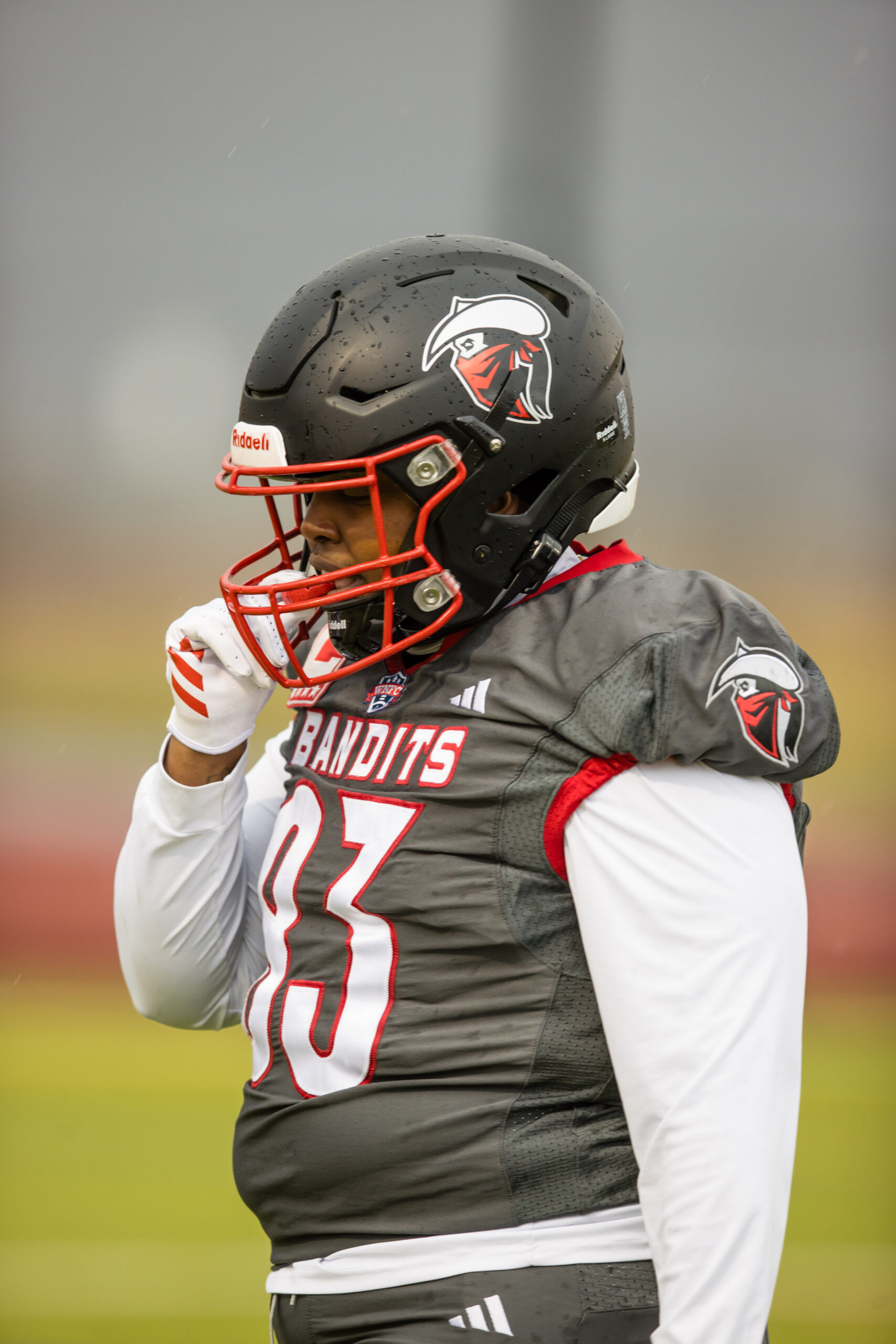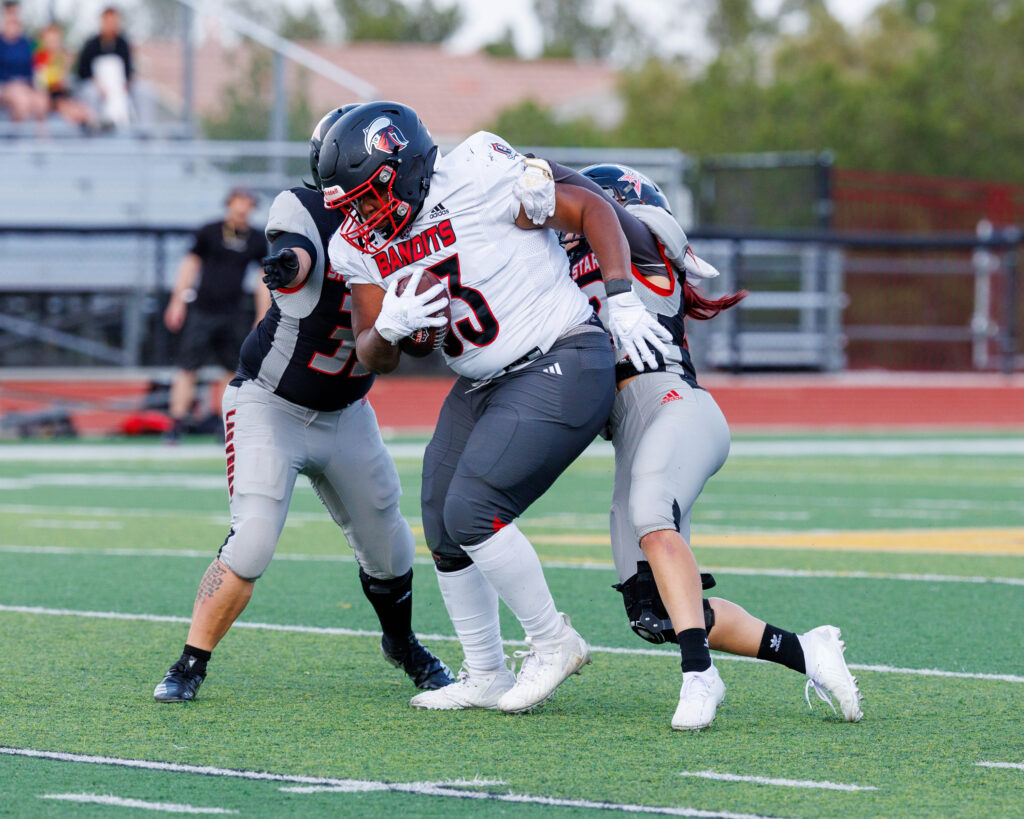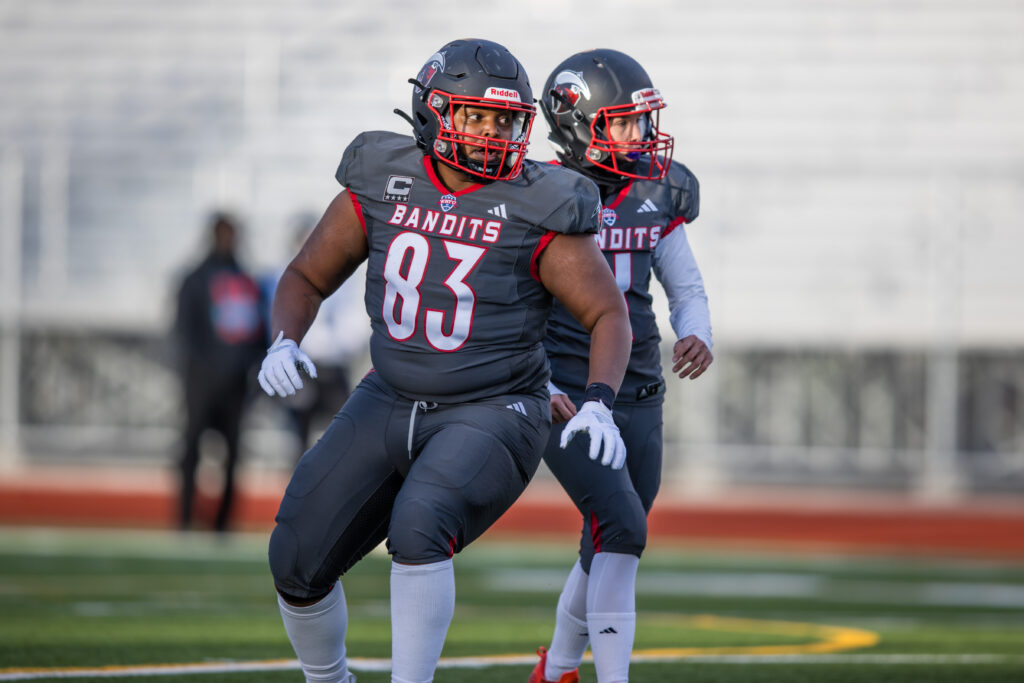a true story about a professional women’s football player & prioritizing joy in adulthood
Date:

April 15, 2025
When Jenessa was recruited to play professional women’s football at a fair, she didn’t believe there was really a league. This is how they returned to the sport they loved as a kid, and what it takes to commit to what you love as you get older.
I first asked Jenessa about football in Cancún, at a work retreat for the tech company where Jenessa and I worked together at the time. I’d noticed they were at the gym a lot during the retreat and had mentioned it was to keep up with a training schedule they were on; so during one of our breaks I asked Jenessa what they were training for.
And that’s when it happened.
The light showed up. Just behind the eyes. The white-hot glitter of someone talking about something they really love.
In a sterile sunlit conference hallway, Jenessa explained they are a professional women’s football player, and this was training season. I had about a million more questions but we were called in for our next session.
So a few weeks later I asked Jenessa if they would do an interview with me about how they became a professional women’s football player, how they make time for such a serious commitment alongside a career in software engineering, and what it really takes to pursue something you love that is also very much unpaid.
*
From the first moment Jenessa saw football on TV, they knew they wanted to play. But, as they remember it, “I wasn’t sure I was going to ever be allowed to play football, because ‘girls don’t play football,’ or so they say.”
But “they” did not include Jenessa’s mom, Angela.
When Jenessa was ten years old, Angela took them and their brother to register for pop warner football. The man behind the long table told Angela that girls don’t play football. Angela told Jenessa to go off and play with her brother while she had a talk with this man. “She says she doesn’t remember what words she chose,” Jenessa says of Angela’s memory of the event, “but they were firm enough to get the job done.”
Jenessa calls this the “big dog version” of their mom. “She was a young mom,” Jenessa says. “She had me at 19. She always used to tell me I was one of the first people to go to college in our family because I was with her while she became the first; I was her college roommate, and it was just me and her for a long time.”
Angela got Jenessa onto the football team, and they loved it. Jenessa remembers thinking: “this is the thing I’m going to do for as long as possible.”
They were the only girl on the team, but they didn’t mind.
“There was no limit in my head, even though what I was seeing was different,” Jenessa says. “I always told people I was going to be the first Black female quarterback in the NFL.
“I don’t feel that bold now. I think it was that that childlike sense of ‘there is no limits.’ We teach kids what the limits are, or at least what we think they are.
“People would always say, ‘Oh, that’s a boy thing,’ and I would always just be like, that’s dumb. I like doing this. I never liked Barbies. I never liked all of the quote unquote girly stuff. To me, it was just like, that’s who I am. So why can I not be this person?
“My mom was always telling me to be who you are. So I was just doing what she said, because that’s all I knew.”
But being who they are became harder as they got older.
Once it was almost time for middle school, Jenessa’s body started to change and they recall feeling, inside that body, a sense of: “I hate it here.”
As Jenessa describes it: “I’m not a person that identifies as very feminine at all. I’m a Black queer masc presenting person that exists in the world. And so the physical development of my body through that time was treacherous for me.
“I was like, I hate everything about myself, and now I don’t want to go play with these boys and have to deal with this. You just start to get those inklings of like, I’m not comfortable anymore.”
Even though they loved playing, Jenessa quit football.
Desperate for an athletic outlet, they turned to women’s basketball instead, playing all throughout high school. In college they joined the rowing team.
After college, while walking around the state fair, a woman in a booth called out to Jenessa, “Hey, you look like you play sports.”
“Yes,” Jenessa replied. “I played sports my whole life.”
“Well,” the woman said, “we are a professional women’s football team.”
“We don’t have one of those,” Jenessa said to her.
Jenessa laughs now as they tell me, “I literally gaslit these people.”
But the woman continued, explaining that there absolutely was a professional women’s football league (there are actually two leagues today) and would they want to come to tryouts? But Jenessa said they’d just graduated college and started a new job and were too busy. But Jenessa gave the woman their email.
Two years later, Jenessa saw an email about tryouts.
Jenessa ignored the email.
Then the state fair came around again, and they went.
“Hey, you look like you play sports,” a woman called out from a booth.
Jenessa stopped. Déjà vu. The third time football had tried to get their attention.
They showed up to tryouts that year, 2017, and made the team.
“It was like a switch went off in my brain,” Jenessa says, “and I was like, ‘football: I’m home.’ And, ‘Why was I not doing this the whole time?’”
For the last eight years Jenessa has played tight end for the Denver Bandits and the Minnestoa Vixen, traveling to 15 states and logging over 1,700 hours playing professional women’s football.
“This is my life now,” they say of their mentality shortly after joining their first team, a deep sense of knowing that this is where they want to be, and a deep sense of commitment I sensed in Mexico: “This is what I do. Engineering is my side hustle and football is my main thing.”
It’s one thing to have a hobby. It’s another to have two professions, both intensive “main things” that require a lot of brain power and time commitment.
“It’s a lot,” Jenessa admits. “Like when you’re committing an additional 12 to 20 hours a week outside of your job, you have to be structured. There cannot be room for error. Mondays, for example, are my errand days.” Jenessa is careful with their time, but that includes taking rest seriously too: “Sundays are my nothing days, my day to melt into the couch.”
While Jenessa is both a professional software engineer and a professional women’s football player, they are only paid for one of those professions. Or rather, one profession pays them, and the other they pay for. “And the more you’re dedicated to football,” Jenessa explains, “the more expensive it can be, which feels backwards, right? I spend thousands of dollars a year on this sport. The league’s goal is ultimately to pay us all, but that’s going to come with time. And that comes with us putting a good product out on the field and being very supportive of each other. We can’t expect other people to care if we don’t care.”
Being paid for the profession is something Jenessa cares about when it comes to equality for women’s sports, but making money is not why they play professionally.
They play because of a feeling.
They describe it as a thrilling feeling you get from working in person, in a physical enviornment and not digital, with people you trust towards a common goal. For Jenessa, this feeling comes singularly from football, and isn’t accessible via any other realm of their life. It’s the kind of feeling we’re often taught isn’t accessible with age, a feeling we’re supposed to learn to let go of after school and college end. Jenessa has decided to ignore that and hold on.

“I realized how much I need competition in my life,” they say, “like sport competition. It’s so much fun to go through the ups and downs of a season with people you would run through a wall for.
“And it doesn’t matter what we do for a living—some are teachers and some work in fast food—we come together three times a week to do this thing that we love.
“Every loss hurts. Every win feels great. And that’s two things you can count on.
“I’m just built for that, and it’s what I need in my life. That thrill.”
Jenessa isn’t thrilled when they lose, though. Their heady sense of competition also means they hate—hate—losing.
Jenessa’s mom knows the drill.
“My mom will tell you, ‘Don’t talk to Jenessa if she loses a thing.’ If she sees us lose, she’ll come down to the field, give me a hug, and say ‘Okay I’ll see you tomorrow.’ Because she knows I don’t want to talk to anybody. Because I’m just thinking of a hundred things we didn’t do and should have done. You get hit by this Mack Truck of thoughts and overthinking and emotion because you just care so much.”
Almost all of Jenessa’s coaches have said Jenessa is one of the highest IQ players they’ve ever coached. The coaches try to coach Jenessa out of their own head: “They’re like, ‘You know what you’re doing; sometimes losses happen.’ And l know that intrinsically, right? But sometimes I just need somebody else to tell me that in that moment. And then I go to sleep and wake up the next day and it’s over. You have to have a short memory. You have to be able to wipe it and move on.”
Jenessa keeps losing, keeps winning, keeps training, and keeps getting older. What keeps them playing year after year?
“Insanity?” Jenessa answers honestly, and we laugh.
“I keep telling myself,” Jenessa says, “that I’m going to retire at 35. But I’m going to keep playing until I don’t love it anymore. And I want the younger people to come out; I’ll play until I lose my spot, right? If I’m performing at a high level and I love it, why stop?
“And I just hope that the girls out there who are like me and want to play these sports when they’re young find us and see us and know what’s possible. I would love to be 80-years-old going to a Denver Bandits game knowing they’re being paid to do this.”

To learn more about the Women’s National Football Conference, please visit wnfcfootball.com and denbandits.com. The best way to show your support, Jenessa says, is to follow the team on social media and come to the games.
And if you liked this story and would like to support independent journalism that prioritizes empathy and human interest stories, you can do that by sharing this story on your social media, subscribing to my newsletter, buying my latest book, or leaving a tip. But please know simply reading to the end is the best support I could receive. Thank you!
The Little Book of Big Dreams is filled with true stories of dreamers who decided to try for their biggest dreams and kept going when things got hard (which they almost always do).
The dreamers in this book include Oscar winner Kristen Anderson-Lopez, Disney producer Don Hahn, Pensole Lewis College founder D’Wayne Edwards, Hamilton cast member Seth Stewart, Black Girls Code founder Kimberly Bryant, and more.
But the most important story in this book is yours.
The Little Book of Big Dreams: True Stories about People Who Followed a Spark
order The Little Book Of Big Dreams
spark your next dream
© Chronicle | Legal | Site Credit |